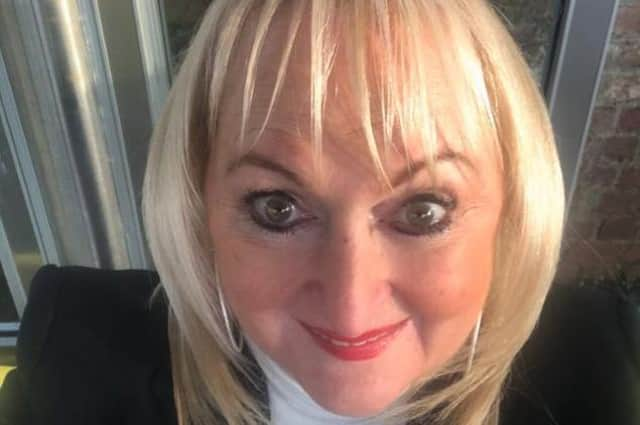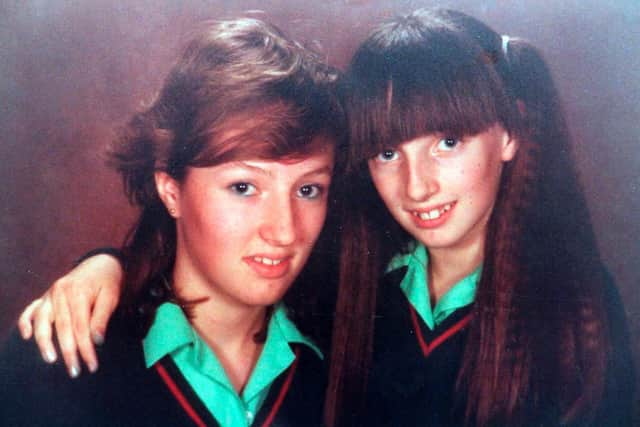Hillsborough justice campaigner Jenni Hicks on her new book One Day In April about daughters Sarah and Vicki


Jenni Hicks’s enduring love for her daughters Sarah and Vicki of course remains unconditional 33 years on from the disaster that killed them, but quite how she finds the strength to openly celebrate their lives decades on is another matter.
This is something she has had to work on since seeing the Hillsborough tragedy unfold in South Yorkshire on April 15, 1989.
Advertisement
Hide AdAdvertisement
Hide AdShe has now released One Day in April, Hillsborough: A Mother’s Story, which explores just that while also shining a light on the personalities of the sisters, who were aged 19 and 15, in a way readers won’t find documented elsewhere.


“Most importantly of all it’s a true and beautiful celebration of my daughters’ lives, and how I have tried to live a good enough life to survive without them, something I thought I would never be able to do,” Jenni tells The Yorkshire Post.
She adds: “I’m never ever going to have the life that I thought I was going to have because both my children were unlawfully killed in the Hillsborough disaster, and the devastation and the travesty of that.
“You have to work hard at being able to build a good enough life for yourself.”
Advertisement
Hide AdAdvertisement
Hide AdMuch has been written about the deadly crush in the early stages of the FA Cup semi-final between Liverpool and Nottingham Forest that led to 97 deaths – but not all of it from a position of intimate knowledge.
“It has been written, usually from academics,” says Jenni.
“This is from a person who was there on the day, who witnessed what happened, who drove to a football match one day as a family and drove home that night, having to leave my daughters on a dirty gymnasium floor in body bags.”
The sisters had travelled to the stadium in Sheffield with their parents, Trevor and Jenni Hicks. Their father was in a less crowded pen on the Leppings Lane end terraces while their mother had a seat in the North Stand.
Inquests in 2015 heard how Sarah had tried in vain to save Vicki during the crush.
Advertisement
Hide AdAdvertisement
Hide AdAt the conclusion of those inquests in April 2016, jurors found that 96 fans had been unlawfully killed.
In July last year, Senior Coroner Andre Rebello concluded the same for a 97th fan, Andrew Devine, who suffered life-changing injuries in the disaster and died 32 years later.
The Hillsborough Family Support Group, of which Jenni was the longest-serving member, has since disbanded.
But the story of One Day In April, as she says, is a celebration of her daughters. How would she describe them?
Advertisement
Hide AdAdvertisement
Hide Ad“I’m their mum – to me, they were most perfect children you could ever wish to have. They were lovely.
“They were kind, caring, lovely, funny, very bright – very, very bright. My eldest daughter, Sarah, had the opportunity to go to Oxford. They went to a very good school. They were just lovely, popular with their friends. And Vicki, my youngest daughter, in particular used to make everybody laugh. She was just so funny without even realising that she was funny.
“They absolutely loved Liverpool FC. Hence why we were at the football match as a family. We had season tickets for Anfield and used to travel up from London for all the games.”
She wrote the book during lockdown periods and it took about 18 months to two years, she says.
Advertisement
Hide AdAdvertisement
Hide Ad“It started as one thing and then turned into something else. I wasn’t going to write about my childhood, but I did. I was basically answering a lot of questions that I’ve been asked over the years, questions like ‘How do you cope?’ or ‘You’re a strong person – what makes you so strong?’ All these questions that I’ve been asked sometimes by complete strangers over the years. I think a lot of those questions are answered in my book.”
Jenni has Yorkshire links: born in Stockton-on-Tees, she lived there until just six months old and was then brought up in Yarm, North Yorkshire.
Her father’s side of the family were all from Yorkshire and her mother’s from County Durham, she says.
Trevor and Jenni, who are now divorced, lived with their daughters in London. “We were just an ordinary family who found ourselves in extraordinary circumstances,” she says.
Advertisement
Hide AdAdvertisement
Hide AdShe adds: “This book is not just about Hillsborough. It’s far more than that. It’s a memoir of my life, my daughters’ lives, our lives as a family. It’s a story of my life before, during and after Hillsborough and, again, how I’ve managed to survive what I previously thought would be impossible for me to survive, which is to live in a world without my daughters.”
But it is also, she says, about “the non-accountability, no justice at all for the 97 unlawfully killed victims of the biggest sporting disaster in UK history”.
Criminal proceedings related to Hillsborough came to an end last year, when the trial of retired Chief Supt Donald Denton, retired Det Chief Insp Alan Foster and former solicitor Peter Metcalf – who were accused of and denied perverting the course of justice following the 1989 disaster – collapsed after the judge Mr Justice William Davis ruled there was no case to answer.
Almost a decade earlier in September 2012, then Prime Minister David Cameron had made a statement to the House of Commons on the release of the Hillsborough Independent Panel report.
Advertisement
Hide AdAdvertisement
Hide AdApologising on behalf of the Government for the “double injustice” of Liverpool fans wrongly being blamed, he said that the report found “164 statements were significantly amended – and 116 explicitly removed negative comments about the policing operation – including its lack of leadership”.
There is much Jenni could say about her feelings on the outcome of the trial and her thoughts on how police handled Hillsborough, though she’s not keen to go through it on this occasion.
One thing she does say, though: “I personally think this goes back to the Yorkshire miners.”
It is well-documented now that some believe the alleged conduct of South Yorkshire Police during and after Hillsborough is similar to that accused of them at what is known as the Battle of Orgreave, when miners and officers violently clashed during strikes in 1984.
Advertisement
Hide AdAdvertisement
Hide AdIn 2015, what was then the Independent Police Complaints Commission decided not to mount a formal investigation into allegations of wrongdoing by officers at the Orgreave coking plant in 1984.
Seeking the truth about Hillsborough though, says Jenni, is ultimately about love.
“You get accused of it being about vengeance. No, it was a huge wrong that happened that day, which we needed to put right and we had to do it for our loved ones ,” she says.
“We had to get the truth about our loved ones’ deaths. We had to get accountability for our loved ones.
“There’s a quote in my book from Martin Luther King Jr, which sums it up: ‘Injustice anywhere is a threat to justice everywhere’.”
One Day In April is out now.